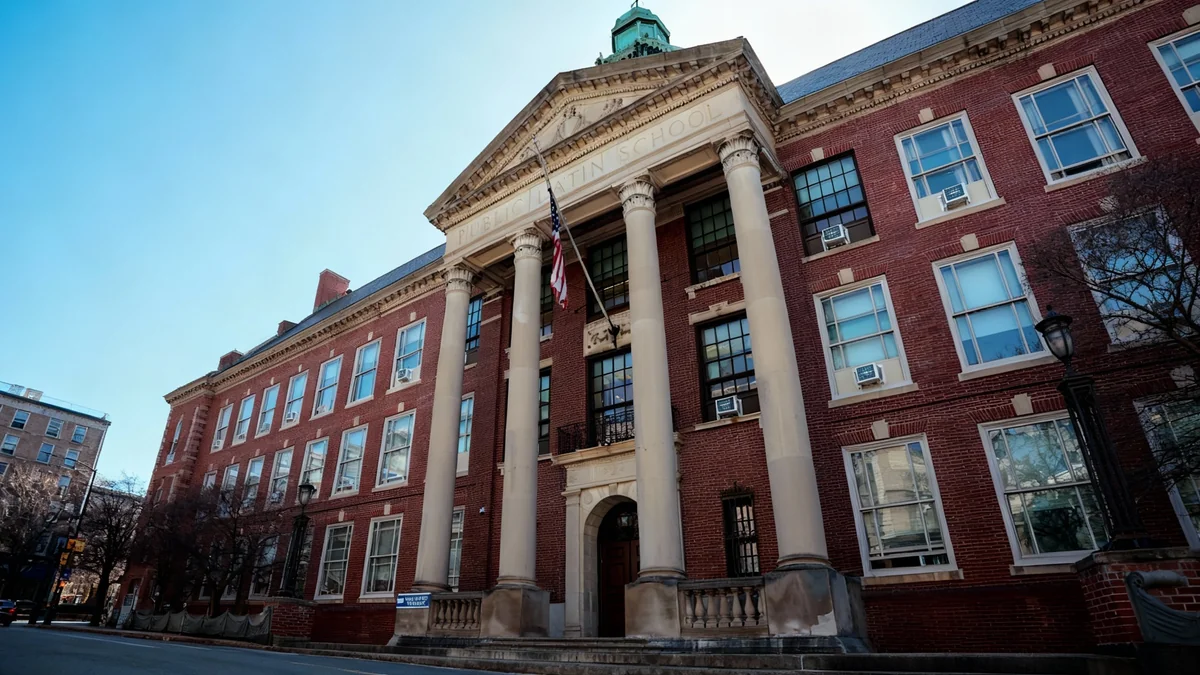Boston Public Schools is considering significant changes to the admissions policy for its three prestigious exam schools, a move that would roll back diversity-focused criteria established less than five years ago. The proposal, set for a School Committee vote on November 5, would alter how students gain entry to Boston Latin School, Boston Latin Academy, and the John D. O’Bryant School of Math and Science.
The new plan suggests eliminating key socioeconomic factors that were originally introduced to create more equitable access for students from disadvantaged backgrounds. This potential policy shift reopens a long-standing and often contentious debate in the city about fairness, merit, and diversity in its most sought-after public schools.
Key Takeaways
- Boston Public Schools proposes removing bonus points for applicants from high-poverty schools.
- The plan would reduce points for students living in public housing or who are in the care of the state.
- Socioeconomic factors would be removed from consideration for 20% of the seats at each exam school.
- A Boston School Committee vote on the proposed new policy is scheduled for November 5.
Details of the Proposed Changes
The proposal currently under review by the Boston School Committee outlines several specific adjustments to the admissions formula. If approved, these changes would represent a significant departure from the system that has been in place since its celebrated adoption amid a national focus on racial equity.
One of the most impactful changes involves the complete elimination of bonus points awarded to applicants from schools with high concentrations of poverty. This system was designed to recognize the academic achievements of students who may have had fewer resources and opportunities compared to their peers in more affluent schools.
Additionally, the proposal calls for a reduction in the weight given to other indicators of socioeconomic disadvantage. Students living in public housing or under the care of the state would receive fewer bonus points than they do under the current system. This adjustment directly impacts some of the city's most vulnerable student populations.
A Two-Tiered System
A core component of the proposal is the division of admissions into two distinct tiers. For 80% of the available seats, a modified version of the current socioeconomic ranking would still apply. However, for the remaining 20% of seats, admissions would be based solely on grades and test scores, with no socioeconomic considerations whatsoever.
This hybrid model aims to balance competing philosophies of merit and equity, but it has drawn criticism from various community stakeholders who fear it will reverse recent gains in diversity at the three exam schools.
The Context of the 2020 Reforms
To understand the significance of the proposed rollback, it is essential to look at the context in which the current policy was created. Less than five years ago, Boston school leaders approved the existing admissions criteria as a direct response to calls for greater racial and economic diversity at its elite institutions.
The policy was seen as a landmark achievement for equity advocates. It moved away from a system based almost entirely on a single entrance exam and grades, incorporating a more holistic view of a student's background. Factors like family income, neighborhood poverty levels, and housing status were integrated to level the playing field.
Boston's Storied Exam Schools
Boston Latin School, founded in 1635, is the oldest public school in the United States. Along with Boston Latin Academy and the O'Bryant School, it has long been a pathway to prestigious universities and successful careers for the city's top students. For decades, however, the demographics of these schools have not reflected the diversity of the Boston Public Schools district as a whole, leading to persistent calls for reform.
The introduction of socioeconomic bonus points was a deliberate effort to diversify the student bodies of these schools, which had seen a disproportionately low enrollment of Black and Hispanic students compared to their representation in the district. The success of this policy in changing the demographic makeup of incoming classes was hailed by many as a positive step forward.
Navigating a Shifting National Landscape
The proposed changes in Boston are not occurring in a vacuum. They align with a broader national trend where diversity, equity, and inclusion (DEI) initiatives in education and other sectors are facing increased scrutiny and legal challenges. This national shift has created a complex environment for school districts trying to balance equity goals with legal and political pressures.
School leaders, including Superintendent Mary Skipper, have framed the discussion around creating a policy that is both "equitable and fair." This language suggests an attempt to find a middle ground in a deeply polarized debate. The challenge lies in defining what constitutes fairness in a city with significant economic and racial disparities.
The debate in Boston mirrors similar conversations happening in other major school districts across the country that use selective admissions processes. These districts are grappling with how to maintain high academic standards while ensuring that access to opportunity is not limited by a student's zip code or family background.
"Every parent wants what is best for their child. The question for the city is how to build a system that allows every child, regardless of their starting point, a genuine opportunity to succeed."
Community Reactions and What Lies Ahead
The proposal has elicited a range of reactions from Boston parents, alumni, and community advocates. For some, like Elizabeth Glaze, a Boston Latin graduate and BPS parent, the exam schools represent a crucial pathway to success that she hopes will be available for her own children. Many families see the potential changes as a step backward from the city's commitment to equity.
Conversely, other groups have actively opposed the current diversity-focused policy. One parents' group recently filed a lawsuit alleging that the existing admissions system discriminates against white and Asian American students. This legal action adds another layer of complexity for the School Committee as it weighs its decision.
Next Steps for the School Committee
The Boston School Committee is now tasked with navigating these competing interests. The upcoming vote on November 5 will be a critical moment for the future of the city's exam schools. The decision will not only determine the admissions process for the next cohort of students but also send a powerful message about the city's priorities regarding education, equity, and merit.
The outcome will be closely watched by educators, parents, and policymakers, as it could set a precedent for how urban school districts address the sensitive issue of selective school admissions in the current political climate. The final policy will shape the composition of Boston's most prestigious public schools for years to come.





